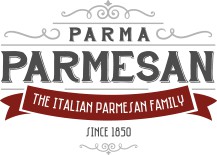No products
Product successfully added to your shopping cart
There are 0 items in your cart. There is 1 item in your cart.
Parmigiano Reggiano is a hard cheese that requires a long ageing period. It contains 30% water and 70% nutrients: for this reason it is rich in in protein, vitamins and minerals.
Easy to digest, completely natural, without additives, without preservatives.
TECHNICAL ANALYSIS OF PARMIGIANO REGGIANO NUTRITIONAL VALUES
The proteins in Parmigiano Reggiano cheese have two key features. First of all, they are are rich in essential amino acid, that’s why it is useful to sprinkle it on pasta, so that you can complete the amino acid level of the wheat, which lacks lysine. Secondly, they are easily absorbed by the body thanks to the action of the proteolytic enzymes in the milk and in the natural whey starter on the casein during the ageing period. The casein is subject to changes that can be compared to a predigestion which leads to the formation of a compound with a molecular weight that gets lower and lower, until only free amino acids remain. These amino acids can then be easily absorbed and are also able to stimulate the secretion of both gastric acid and pepsin.
It’s only recently been discovered that this proteolytic activity frees peptides that are “hidden” in proteins. These bio-active peptides affect the organism through specific mechanisms, by reaching target spots in the gastrointestinal tract or the peripheral organs (once they were absorbed by the systemic circulation through carrier-guided transportation or with paracellular diffusion). These processes positively
modulate the organism’s regulatory processes. Predigestion of the casein makes the Parmigiano Reggiano similar to a protein hydrolysate, which could play a key role in the nutrition of people who are allergic to the proteins present in cow milk.
The lipids in Parmigiano Reggiano are those of a semi fat cheese, considering that it is produced with partially skimmed milk. Indeed, the fat content of Parmigiano Reggiano is lower than the fat content of most other cheeses.
Carbohydrates are practically absent in Parmigiano Reggiano as there is no lactose given that it disappears in the first hours of production when it is transformed into lactic acid. This immediate acidification is one of the main features of the peculiar production process of this cheese.
The above analysis is backed up by experimental documentation carried out through a series of analyses in which the lactose concentration appeared to be within a range going from “not detectable” to 0.39 mg/100g or 0.1 mg/100 kcal. Therefore, Parmigiano Reggiano can be defined without any doubt as lactose free.
In breast fed babies, the bifidobacteria are predominant compared to potential pathogen bacteria; this is one of the main reasons why the mother’s milk usually guarantees better health for a child. Since the eighties, it is thought that there is a “bifidogenic factor” in Parmigiano Reggiano, with a specific prebiotic activity which makes it suitable for the nutrition of babies.
Parmigiano Reggiano is an important source of calcium, a crucial element for the growth and nourishment of the skeleton, that is, however, lacking in many diets. A dose of 40 grams of Parmigiano Reggiano supplies more than 50% of the daily need of this precious element.
PARMIGIANO REGGIANO NUTRITIONAL VALUES
Nutritional values per 100g (3.5 oz)
| Water | g 30,8 |
| Protein | g 33,0 |
| Fat | g 28,4 |
| Sodium Chloride | g 1,39 |
| Calcium | mg 1160 |
| Phoshporus | mg 680 |
| Sodium | mg 650 |
| Potassium | mg 100 |
| Magnesium | mg 43 |
| Zinc | mg 4 |
| Vitamin A | mcg 270 |
| Vitamin B1 | mcg 34 |
| Vitamin B2 | mcg 370 |
| Vitamin B6 | mcg 110 |
| Vitamin B12 | mcg 4,2 |
| Vitamin PP | mcg 55 |
| Pantothenic acid | mcg 320 |
| Choline | mg 40 |
| Biotin | mcg 23 |
